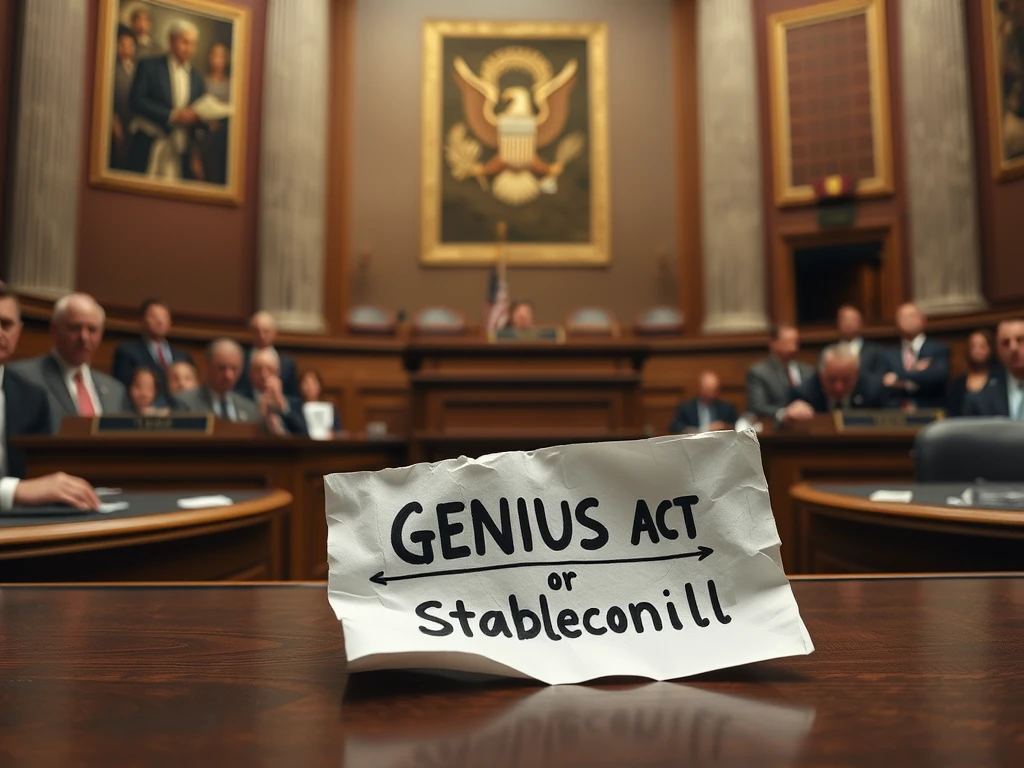Crucial US Stablecoin Bill Vote Fails: What Happens Next?

The push for clear rules around stablecoins in the United States hit a major roadblock recently. The proposed US stablecoin bill, known as the GENIUS Act, failed to advance in the Senate. This development is significant for the crypto industry and raises questions about the future of stablecoin regulation.
Why the Senate Stablecoin Vote Failed
On May 8, a crucial Senate stablecoin vote on the GENIUS Act did not garner enough support, falling short in a 48-49 tally. A key reason cited for the failure, particularly by some Democratic lawmakers, was concerns surrounding former President Donald Trump’s financial ties to the cryptocurrency industry.
Opponents argued that advancing digital asset legislation without addressing potential conflicts of interest related to Mr. Trump’s reported significant Trump crypto holdings and connections was inappropriate. Representative Maxine Waters stated that the Republican bill didn’t address Trump’s conflict and could grant him authority over stablecoin rules.
What are the Next Steps for the US Stablecoin Bill?
Despite the setback, proponents of the bill quickly signaled intent to revisit the legislation. Immediately after the failed vote, Majority Leader John Thune made a motion to reconsider the bill. This procedural move allows for another vote to potentially occur within days.
However, a source indicated that Republicans supporting the bill are unlikely to modify it to restrict investments by Mr. Trump or his administration, believing such a change exceeds Congress’s authority.
The Senate resumed consideration of the motion to proceed to the GENIUS Act on May 12, suggesting another vote is imminent. Liat Shetret of Elliptic noted that this delay isn’t necessarily negative, providing time for parties to clarify provisions and address concerns before the bill returns to the floor.
Navigating the Path to Stablecoin Regulation
The path forward for comprehensive stablecoin regulation remains uncertain. If the bill is reintroduced without changes addressing the conflict of interest concerns, it’s unclear if it could overcome a potential Democratic filibuster, which requires 60 votes to bypass.
The controversy stems partly from the Trump family’s links to World Liberty Financial and its USD1 stablecoin, as well as reports of offering access to Mr. Trump via payments using his TRUMP memecoin. These connections have fueled calls for legislative action to prevent officeholders and their families from profiting from memecoins.
Senators Elizabeth Warren and Chris Van Hollen have reportedly urged Mr. Trump to divest from USD1 before engaging in foreign deals. Reports suggest Mr. Trump’s crypto holdings could be substantial, representing a significant portion of his wealth.
The Cedar Innovation Foundation, linked to the Fairshake PAC (a major spender in US elections supporting pro-crypto candidates), has urged Senate leadership to pass a stablecoin bill quickly, calling for an end to political games.
The Broader Impact on Crypto Regulation
The political dynamics surrounding the US stablecoin bill highlight the challenges facing broader crypto regulation efforts in Congress. The debate is now intertwined with political conflicts and concerns over potential corruption.
While some lawmakers are pushing for swift action to provide regulatory clarity for stablecoins, others prioritize addressing perceived conflicts of interest before moving forward. This division complicates the legislative process and could delay the implementation of clear rules for the crypto market.
Summary
The recent failure of the US stablecoin bill in the Senate underscores the complex political landscape surrounding crypto regulation. While a motion to reconsider the bill is in place, allowing for a potential revote soon, the underlying concerns about Trump crypto ties remain unresolved. The outcome of the next Senate stablecoin vote and the ability of lawmakers to bridge the partisan divide will be critical in determining the future of stablecoin regulation in the United States.







